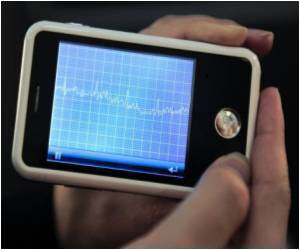American researchers have developed a new smartphone accessory for iPhone cameras that can read a person’s cholesterol levels simply by scanning his selfies.

"Smartphones have the potential to address health issues by eliminating the need for specialized equipment," said David Erickson, Cornell associate professor of mechanical engineering and senior author on a new peer-reviewed study. Thanks to advanced, sophisticated camera technology, Erickson and his colleagues have created a smartphone accessory that optically detects biomarkers in a drop of blood, sweat or saliva. The new application then discerns the results using color analysis.
When a user puts a drop of blood on the cholesterol test strip, it processes the blood through separation steps and chemical reactions. The strip is then ready for colorimetric analysis by the smartphone application.
The smartCARD accessory – which looks somewhat like a smartphone credit card reader – clamps over the phone's camera. Its built-in flash provides uniform, diffused light to illuminate the test strip that fits into the smartCARD reader. The application in the phone calibrates the hue saturation to the image's color values on the cholesterol test strip, and the results appear on your phone.
Currently, the test measures total cholesterol. The Erickson lab is working to break out those numbers in LDL ("bad" cholesterol), HDL ("good" cholesterol) and triglyceride measurements. The lab is also working on detecting vitamin D levels, and has previously demonstrated smartphone tests for periodontitis and sweat electrolyte levels.
"By 2016, there will be an estimated 260 million smartphones in use in the United States. Smartphones are ubiquitous," said Erickson, adding that although smartCARD is ready to be brought to market immediately, he is optimistic that it will have even more its advanced capabilities in less than a year. "Mobil health is increasing at an incredible rate," he concluded. "It's the next big thing."
Advertisement
Source-Eurekalert















